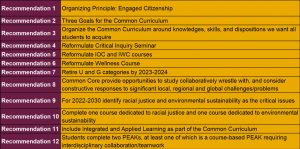On Nov. 2, 2018, after posters saying “It’s okay to be white” popped up on the college’s campus, students decided they needed to do something. Students across campus walked out of their classes as a show of force to the administration.
The year before, students performed a sit-in in the Integrated Science Center for the same reason: a desire for change. Students across these two protests demanded a change to the college’s curriculum.
In light of these events, the Concordia faculty senate formed the Core Reform Steering Committee.
On Monday, Nov. 1, 2021, the faculty senate voted to reform both the Core Curriculum and all Inquiry Seminars based on the principle of “Engaged Citizenship” as put forward by the CRSC.
The CRSC’s reforms explain that “Citizenship is understood in its broadest sense – as a citizen of the world – the biosphere and the social sphere.”
While the CRSC did not have many specifics on either of the reforms as that would be the work of a separate implementation committee, they did recommend, among other things, requiring every student take a course dedicated to racial justice and a course dedicated to environmental sustainability.
That evening, faculty and administrators across campus gathered in the Centrum. Provost and professor of psychology Susan Larson called on David Kelm, a student on the CRSC, to speak on behalf of the CRSC about the proposed reforms.

“It requires examining power and privilege,” said Kelm. “It requires examining how one is an actor in democracy.”
He explained that the idea of Engaged Citizenship did not replace BREW (Becoming Responsibly Engaged in the World), but added to it. After all, being an engaged citizen is what BREW is all about, said Kelm.
Kelm, who was a first-year student that participated in the walkout, was now a senior standing in front of dozens of Concordia staff to plead the case for what he and the many other members of the CRSC had worked on for years. Many students who worked on these reforms have since graduated and passed the torch onto their younger reformers.
David Creech, professor of religion, questioned whether or not the proposed guiding principle addressed the racial justice that students wanted. He wanted to “make sure we are addressing issues around race and diversity,” when creating these core curriculum reforms.
Some voiced their discomfort, not because of what the guiding principle stood for, but because of certain connotations it may carry. Carol Pratt, professor of biology, said she took issue with the word “citizenship,” not in the way the CRSC defined it, but because the word carries certain exclusionary implications. Nathan Axvig, professor of math, added that students seem to resonate with the idea of inclusion, and he wondered how citizenship could play into that idea.
Senior Concordia student Amina Fatkhulloeva said the exact wording of the guiding principle is less important than how it is implemented.
“Our mission statement can also be exclusive as it is read: engaged in world affairs based on the Christian tradition,” said Fatkhulloeva.
She stressed that how it is defined and then used among the student body is vital to reducing any problems that may come up from the words “Engaged Citizenship.”
Mark Jensen, professor of chemistry, raised concerns about the relationship between BREW and Engaged Citizenship. While Jensen was certainly in favor of the reforms, he had reservations about how well the new guiding principle could be marketed.
“BREW is good for marketing. It was something that resonated with people,” said Jensen. “Engaged Citizenship does not have that resonance with me.”
“While BREW resonated well with you as an insider, it is an internal language. It is an acronym that does not explain itself to people who are not in our community,” said George Connell, dean of the School of Arts and Sciences.
The discussion eventually died down and ballots were passed out to members of the senate. Voting was typically done verbally, but because of the impact these reforms could have, voting was done via paper ballot to allow for a level of anonymity.
The motions passed: 34 in favor, 2 against and 2 abstentions; 37 in favor and 2 against. The Core Curriculum and Inquiry Seminars will be reformed.
“This is a monumental opportunity,” said Larson.
For more information on the reforms, visit the faculty senate Moodle site and view the agenda for Nov. 11, 2021.
